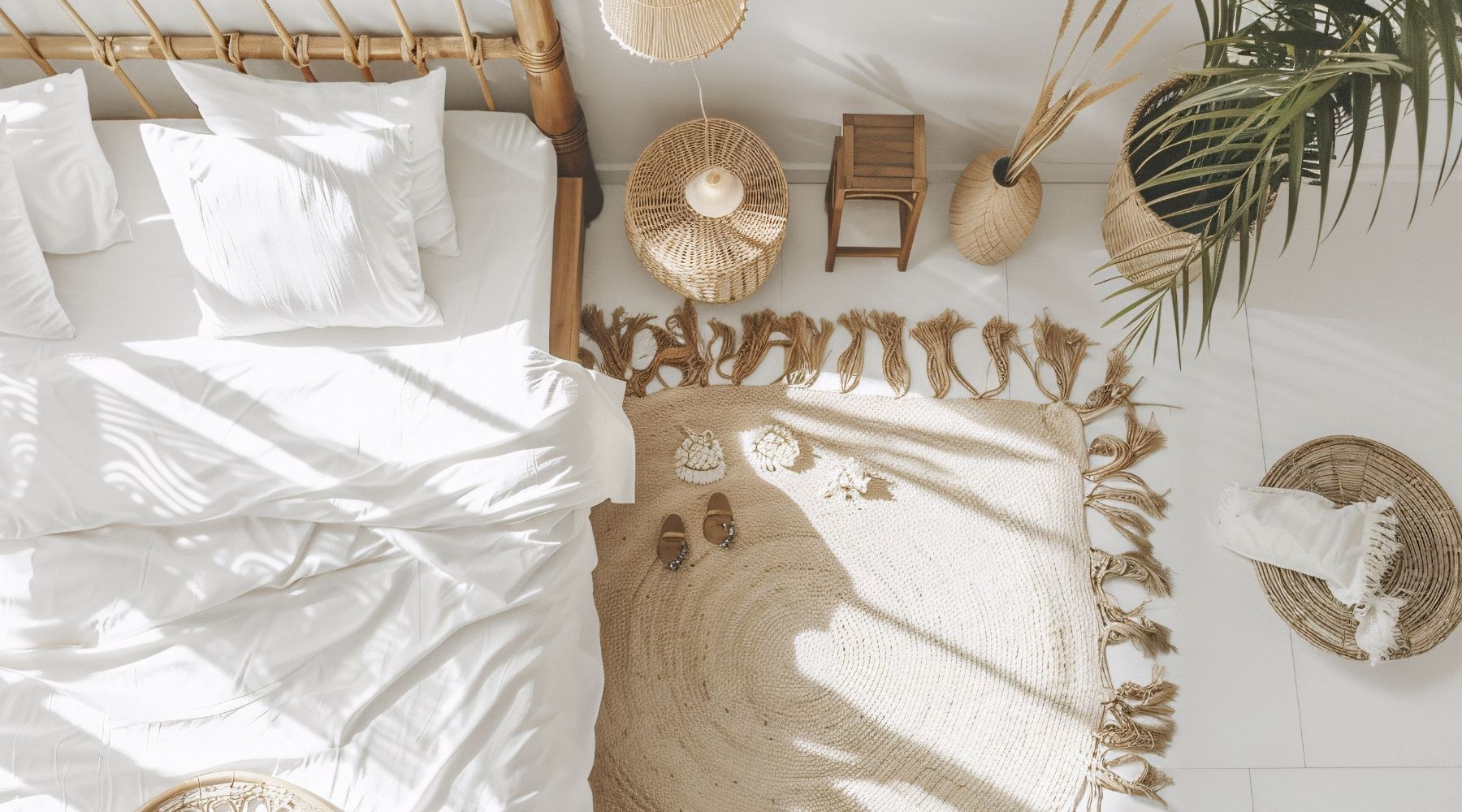Choosing the right bedding can make all the difference between a good night’s sleep and a restless one. With so many fabric options on the market, bamboo and cotton stand out as two of the most loved and most debated choices.
Both are natural fibres known for their comfort, breathability, and timeless appeal, but they behave quite differently in practice. Whether you’re seeking ultra-soft luxury, crisp freshness, or long-lasting durability, understanding these differences will help you choose the perfect bedding for your lifestyle.
Here’s everything you need to know about bamboo vs cotton bedding - how they compare in feel, breathability, sustainability, and overall sleep quality.
Understanding the Fabrics: Bamboo vs Cotton
Bamboo and cotton both begin life as plants, but the way they’re transformed into bedding fabrics sets them apart.
Bamboo bedding is made from fast-growing bamboo plants, which are turned into a smooth, silky fibre through an eco-conscious manufacturing process. The result is a fabric that feels luxuriously soft and drapes beautifully on the bed.
Cotton bedding, on the other hand, has been a bedroom staple for centuries. Ethical Bedding uses only organic cotton, grown without harmful pesticides or synthetic fertilisers. Organic cotton fibres are spun into threads and woven into either sateen (for a silky feel) or percale (for a crisp, matte finish).
In essence, bamboo offers a modern, silky sleep experience, while cotton delivers classic, timeless comfort.
Comfort and Feel: The Sleep Experience
The first thing most people notice about their bedding is how it feels against the skin - and this is where bamboo and cotton begin to differ.
Bamboo bedding has a naturally silky, buttery texture. It’s ideal for those who love smooth, flowing sheets that glide over the skin. Because bamboo fibres are round and free of rough edges, the fabric feels exceptionally gentle - even for people with sensitive skin or allergies.
Cotton bedding varies depending on the weave:
-
Cotton Sateen feels smooth, lustrous, and slightly heavier - perfect for creating a luxurious, hotel-style bed.
-
Cotton Percale feels crisp, cool, and breathable - ideal for warm climates or anyone who prefers a lighter, classic cotton feel.
So, if you love silky softness, bamboo might be your match. If you prefer that crisp “fresh sheets” sensation, cotton percale is your best bet. And for indulgent smoothness with a touch of structure, cotton sateen strikes the perfect balance.
Breathability and Temperature Regulation
Overheating at night can ruin even the best sleep setup. That’s why breathability is a key factor when comparing bamboo and cotton.
Bamboo bedding naturally wicks away moisture and promotes airflow, helping regulate body temperature throughout the night. It’s especially beneficial for hot sleepers or those living in humid climates, as the fabric draws sweat away from the skin and dries quickly.
Cotton bedding is also highly breathable, especially organic percale, which has a looser weave that encourages air circulation. Cotton sateen, while slightly denser, still offers excellent temperature balance and can feel warmer in cooler months.
In short, bamboo keeps you cooler year-round, while cotton gives you seasonal flexibility - crisp percale for summer, sateen for winter.
Durability and Longevity
When it comes to longevity, both bamboo and cotton can stand the test of time - but they require a little care.
Bamboo bedding is known for its strength and resilience despite its silky softness. When cared for properly (gentle wash, cool cycles, no harsh detergents), bamboo fibres maintain their smooth texture and colour for years.
Cotton bedding, particularly organic varieties, is renowned for becoming softer with every wash. Percale cotton tends to be slightly more resistant to wear and pilling, while sateen may show minor signs of sheen loss over time if exposed to excessive heat in washing or drying.
If durability is a priority, both fabrics perform beautifully - provided they’re washed gently and rotated between sets.
Sustainability and Environmental Impact
One of the biggest advantages of both bamboo and organic cotton bedding is sustainability - but the way they achieve it differs.
Bamboo is one of the most renewable plants on Earth. It grows rapidly without fertilisers or pesticides and requires far less water than conventional cotton. When produced responsibly, bamboo bedding has a significantly smaller environmental footprint.
Organic cotton, meanwhile, supports soil health, biodiversity, and the wellbeing of farming communities. It avoids synthetic chemicals entirely, relying on natural pest management and crop rotation.
Here’s a quick comparison:

Both materials align beautifully with Ethical Bedding’s ethos of sustainable luxury - offering eco-friendly comfort without compromise.
Maintenance and Care
How easy is it to care for bamboo or cotton bedding? The answer: very, as long as you treat them gently.
-
Washing: Use mild detergent, cold or warm water, and avoid bleach or fabric softeners.
-
Drying: Line dry when possible, or tumble dry on a low heat setting to preserve fibres.
-
Ironing: Bamboo resists wrinkles naturally, while cotton may need a light iron for a crisp finish.
-
Storage: Always store in a cool, dry place - both fabrics are naturally resistant to odours and bacteria.
Regular care not only preserves the look and feel of your bedding but also extends its lifespan, making your investment last longer.
Price and Value Over Time
At first glance, bamboo bedding may cost slightly more than cotton, but the difference is often offset by longevity and comfort.
Bamboo offers exceptional value over time - it resists wear, stays fresh longer between washes, and maintains softness without fabric conditioners.
Organic cotton, on the other hand, provides timeless comfort and durability with a slightly lower starting price. Cotton percale sets are especially long-lasting, while sateen brings a more luxurious look and feel for its price.
Both options offer excellent long-term value - especially when compared to synthetic or low-quality alternatives that need frequent replacement.

Shop Ethical Beding's Organic Cotton Percale Pillowcase Pair here.
Frequently Asked Questions: Bamboo vs Cotton Bedding
Q1: Which fabric is cooler to sleep on - bamboo or cotton?
Bamboo tends to feel cooler to the touch and regulates temperature more effectively, making it ideal for hot sleepers. Cotton percale is also very breathable, offering a light, airy sleep experience.
Q2: Is bamboo bedding softer than cotton?
Yes, bamboo feels silkier and smoother against the skin, while cotton offers either a crisp (percale) or soft (sateen) touch depending on the weave.
Q3: Which lasts longer - bamboo or cotton?
With proper care, both can last several years. Bamboo maintains its softness exceptionally well, while cotton becomes softer and more comfortable over time.
Q4: Is bamboo bedding environmentally friendly?
Yes. Bamboo is fast-growing and requires little water or chemicals, making it one of the most sustainable bedding materials available.
Q5: What’s the best choice overall?
It depends on your sleep style: choose bamboo for silky, cooling comfort; cotton percale for crisp freshness; and cotton sateen for smooth, luxurious softness.
The Final Verdict
When it comes to bamboo vs cotton, there’s no single winner - only what’s best for your sleep style.
If you love silky softness and cooling comfort, bamboo is a beautiful choice. If you prefer classic, breathable textures, organic cotton (sateen or percale) delivers timeless quality.
At Ethical Bedding, both materials are sourced sustainably, crafted to last, and designed with comfort in mind, because great sleep shouldn’t come at the planet’s expense. Explore our bamboo and organic cotton bedding range here.








Share:
Why Bedding Is the Most Personal Gift (And How to Choose the Right Feel)
OEKO-TEX vs GOTS: Which Bedding Certification Matters Most?